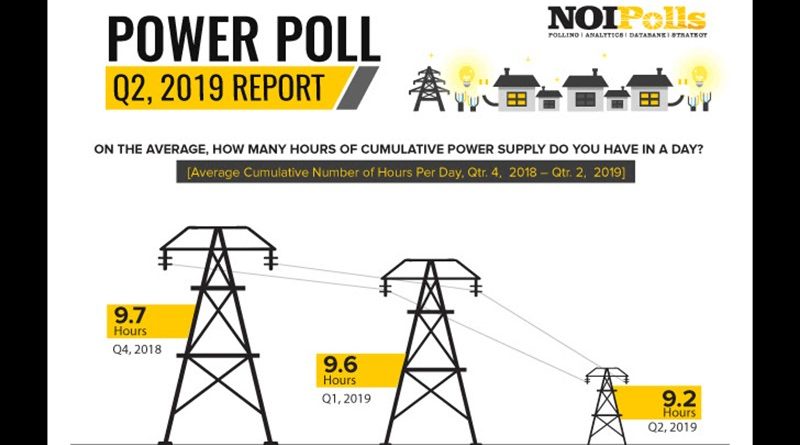Nigerian Households Experienced A Decline in Power Supply in Q2, 2019
The newPower Poll released by NOIPolls for the second quarter (Q2) of 2019 has revealed that power supply to Nigerian households experienced a marginal decline to stand at 31 percent in Q2 from 37 percent obtained in Q1, 2019. This decline may be attributed to the continuous breakdown of the national grid and other daunting challenges experienced at both levels of generation and transmission of electricity in the country within this period.[1]
The decline in power supply has in no doubt hampered economic activities, especially of businesses whose operation depends majorly on power supply. On the bright side, it is worthy to note that there has been a steady increase in power supply from the month of April to June 2019. This steady increase observed in Q2, 2019 could be ascribed to the raining season as the water level in the hydroelectric power generation is within expected capacity.
The poll results also revealed that the quarterly average cumulative hours of power supply experienced a marginal decline to stand at 9.2 hours in Q2, 2019 from 9.6 hours in Q1, 2019. This cumulative hourly average for Q2, 2019 is a considerable far cry from 24 hours of power supply which is required for the overall progress and development of the country and its citizenry.
Background
The power situation in Nigeria has continued to worsen over the years despite the weighty and substantial investments in the sector by past and present administrations in the country. What is more worrying in the power conundrum is that the more money is expended in the sector, the darker the country becomes as regards to power supply.[2] For instance, Nigeria has expended an estimate sum of N5 trillion ($31.45 billion) in the last 20 years to generate power however, only a maximum of about 5,074 Megawatts of electricity could be generated within this period; which is still grossly inadequate and derisory.
It is also worthy of note that the national grid in Nigeria has collapsed three times in 2019 thereby plunging the country into darkness. This detrimental and undesirable event highlights a major challenge in the power sector which needs urgent attention due to its devastating effects on the country’s economy. It must also be stated that for a country of approximately 200 million Nigerians, a minimum of 30,000 megawatts of electricity need to be generated. It is against this backdrop that NOIPolls conducted its quarterly power poll to assess electricity distribution to Nigerian households in the second quarter of 2019.
Survey Findings
Nationwide Quarterly Tracking on Power Supply
Quarterly analysis of results revealed that a larger proportion of Nigerians (37 percent) reported that they experienced better power supply to their respective households in Q1, 2019 than in Q2, 2019 (31 percent). This signifies a 6 percent decline when Q1 is compared to the Q2.

Nationwide Quarterly Average Daily Cumulative Power Supply to Nigerian Households
Further findings over the period in view showed that the average hours of cumulative power supply to Nigerian households nationwide was also highest in Q1, 2019 at an average of 9.6 hours daily.

Nationwide Monthly Tracking on Power Supply
Monthly analysis of power supply to Nigerian households Q2, 2019 revealed a steady increase in the proportion of Nigerians who experienced an improvement from April (28 percent) to June (36 percent). Although a closer at the first half of 2019 revealed that more Nigerian households experienced improvement power supply in January (46 percent) compared to any other month in view.

Nationwide Monthly Daily Cumulative Hours of Power Supply to Nigerian Households
Subsequently, monthly analysis revealed that the month of June (9.4 hours) recorded the highest average daily cumulative hours of power supply to Nigerian households. However, analysis for the first half of the year showed that the month of January had the highest average daily cumulative hours of power supply to Nigerian households which stood at an average of 10.2 hours daily.

In conclusion, the poll has revealed a marginal decline in power supply in Q2, 2019 when compared to Q1, 2019. While NOIPolls continues to track the state of power supply in the country, trends have revealed that Nigeria may continue to experience challenges in power supply unless a drastic, concerted and spirited effort is put in place to upgrade the power generation and distribution, as well as pricing in the country.
It is imperative that all stakeholders in the power sector and the government to revaluate the strategies set up for addressing the issue of power in Nigeria as not much progress has been recorded since the privatisation of the sector. This exercise should a higher level of concentration on the renewable sources of energy. This singular action of solving the power challenges in the country will bring about the much-needed boost to the country’s economy thereby fostering prosperity and progress for all Nigerians.
Survey Methods
The opinion poll was conducted over a period of three months (April to June 2019). It involved telephone interviews of a random nationwide sample. 3,000 randomly selected phone-owning Nigerians aged 18 years and above, representing the six geopolitical zones in the country, were interviewed. With a sample of this size, we can say with 95% confidence that the results obtained are statistically precise – within a range of plus or minus 4.65%. NOIPolls Limited is the No. 1 for country specific polling services in West Africa. We conduct periodic opinion polls and studies on various socio-economic and political issues in Nigeria. More information is available at www.noi-polls.com.
Disclaimer
This press release has been produced by NOIPolls Limited to provide information on all issues which form the subject matter of the document. Kindly note that while we are willing to share results from our polls with the general public, we only request that NOIPolls be acknowledged as author whenever and wherever our poll results are used, cited or published. NOIPolls hereby certifies that all the views expressed in this document accurately reflect its views of respondents surveyed for the poll, and background information is based on information from various sources that it believes are reliable; however, no representation is made that it is accurate or complete.
Whilst reasonable care has been taken in preparing this document, no responsibility or liability is accepted for errors or fact or for any views expressed herein by NOIPolls for actions taken as a result of information provided in this report. Any ratings, forecasts, estimates, opinions or views herein constitute a judgment as at the date of this document. If the date of this document is not current, the views and content may not reflect NOIPolls’ current findings and/or thinking.




